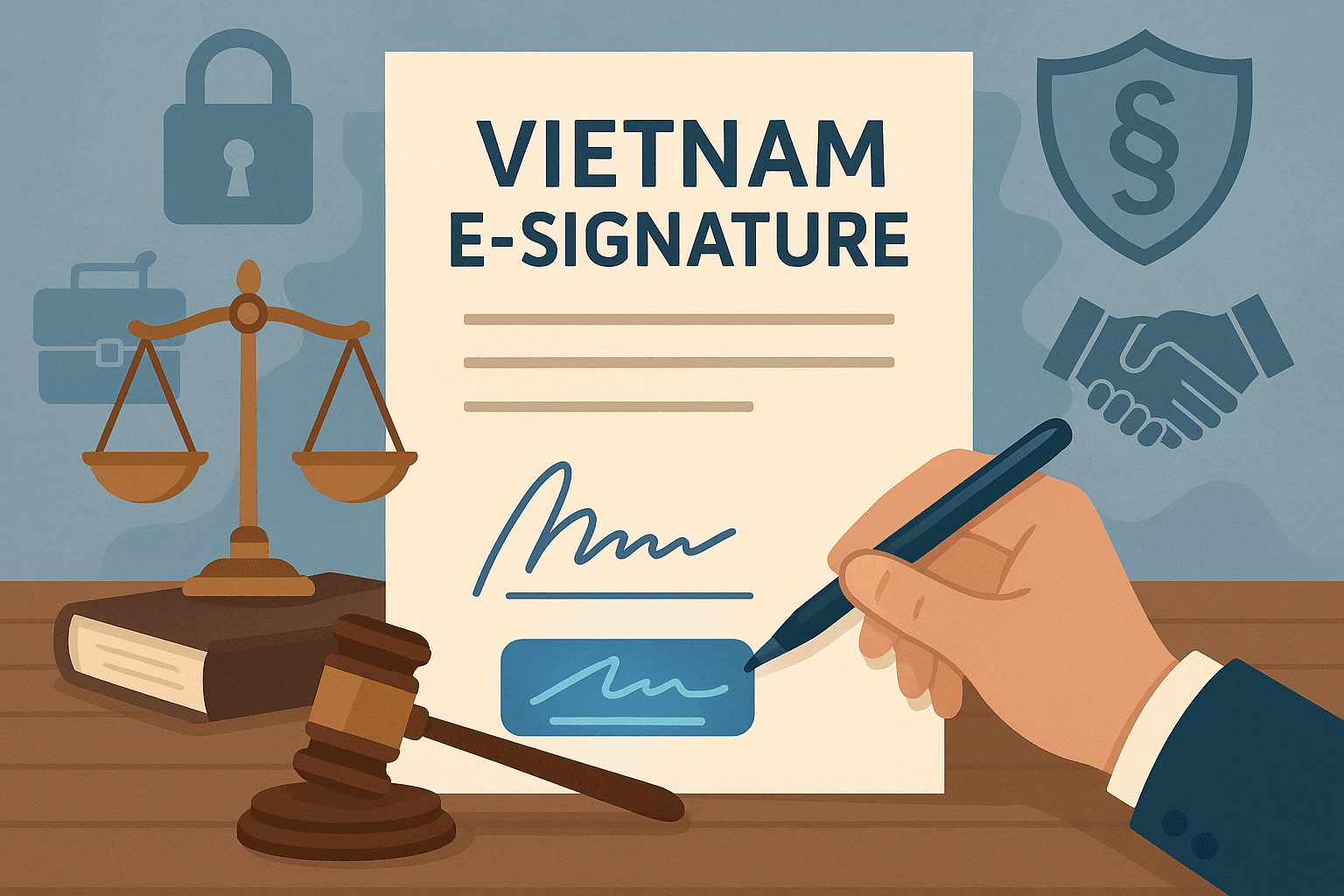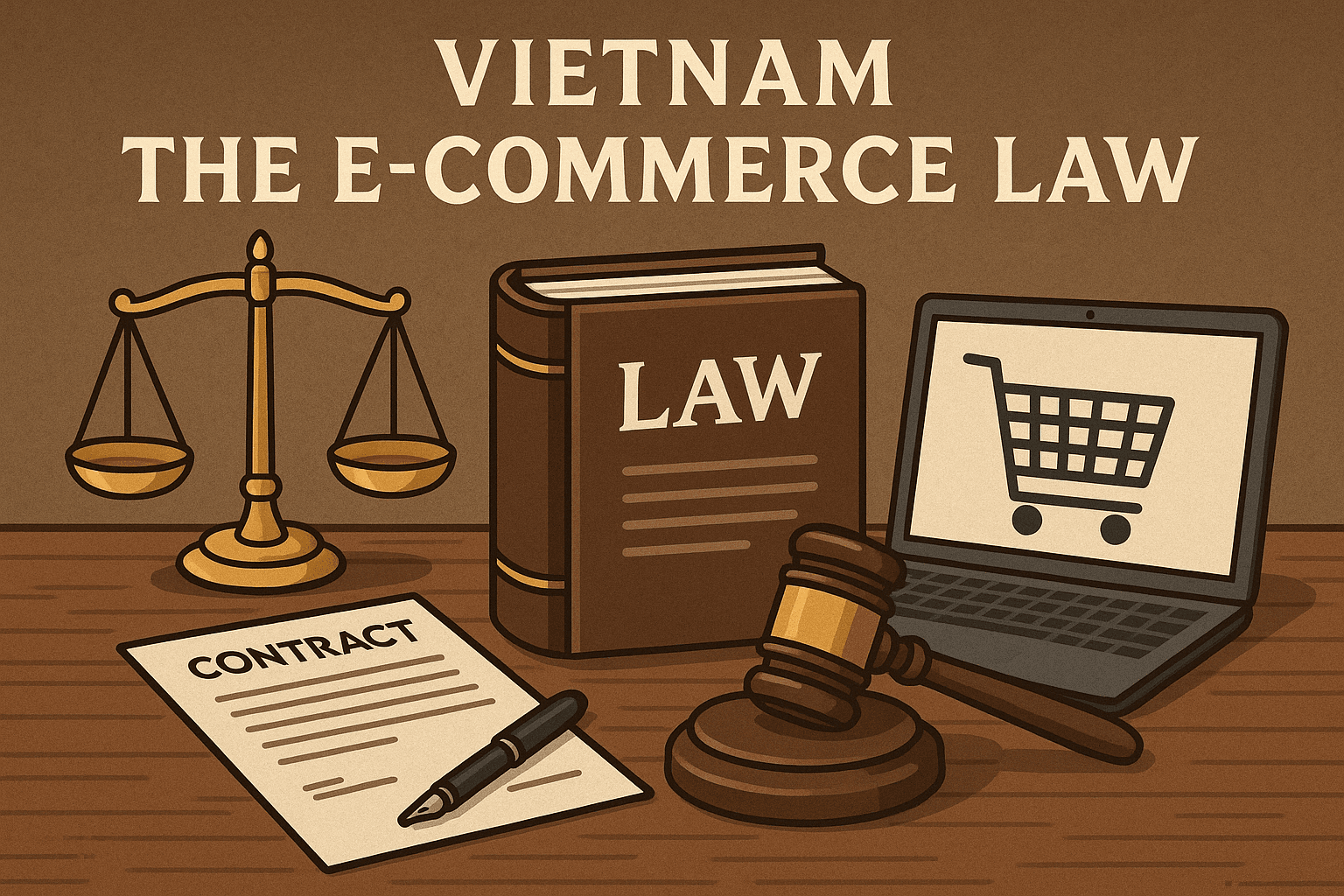WhatsApp or email with our sales team or get in touch with a business development professional in your region.
Top 5 E-Signature Software for Vietnam Businesses in 2025





As Southeast Asia deepens its digital transformation push, the demand for secure, legally compliant electronic signature solutions has accelerated across industries. From state-owned banks in Vietnam to mid-sized e-commerce hubs in Malaysia, enterprises are urgently adopting e-signature platforms to enhance contract turnaround speed, meet local regulatory mandates, and minimize error-prone paperwork. Yet navigating the fragmented regulatory environment—such as Vietnam’s E-COMMERCE LAW (No.20/2023/QH15) and cryptographic requirements under Decree No.130/2018/ND-CP—poses a challenge for companies selecting the right provider. At the intersection of legal compliance, cryptographic security, and workflow optimization, digital signature platforms have become indispensable to organizations seeking scalability and trust in transactional digitization.

Understanding Digital Signature vs. Electronic Signature
Before exploring platforms and market choices, it’s critical to distinguish between the types of signatures. An “electronic signature” (e-signature) refers to any electronic process that indicates acceptance of an agreement or a record. In contrast, a “digital signature” uses cryptographic algorithms to ensure the authenticity and integrity of a message or document.
Vietnam’s legal framework makes this distinction explicit. Under Article 8 of the 2023 E-COMMERCE LAW (ET Act), electronic signatures must be “reliable” and use methods ensuring identity verification and data integrity. Digital signatures—regulated explicitly under Decree No.130/2018/ND-CP—require certificate-based identification through licensed certification authorities (CA), typically involving cryptographic tools such as Public Key Infrastructure (PKI). Compliance with both is a prerequisite for enforceability in Vietnamese courts.

Asia-Pacific Digital Signature Market Outlook for 2025
The digital signature market in APAC is forecast to grow at a CAGR of 30.2% through 2025, according to MarketsandMarkets, reaching USD 3.4 billion. This surge is fueled by a hybrid workforce, increasing regulatory standardizations (e.g., Singapore’s ETA Act and Malaysia’s Digital Signature Act), and the digitization strategies embedded in national fintech agendas.
Southeast Asia, especially Vietnam, is witnessing significant growth due to local legal reform efforts. The central government’s mandate for state units to digitize 100% of their workflows by 2026 underscores the expanding need for compliant, locally-integrated platforms. Moreover, regional SMEs, representing 97% of businesses in ASEAN, increasingly demand affordable platforms with built-in compliance layers and multi-language UI support.
Key Technologies Behind Secure Digital Signatures
At the core of legally binding digital signatures are two foundational technologies: Public Key Infrastructure (PKI) and Certification Authorities (CAs).
PKI enables asymmetric encryption—one key for creation and another for verification—so that any tampering invalidates the signature. It provides end-to-end document integrity and identity assurance.
Certification Authorities, licensed by national agencies such as Vietnam’s Ministry of Information and Communications, play a central role by issuing and verifying digital certificates required for signature generation. Under Decree 130, only recognized CA providers can issue Qualified Digital Signatures (QDS) in Vietnam, a prerequisite for advanced workflows such as government contracts or notarizations.
Leading Digital Signature Providers in 2025
eSignGlobal: Asia’s Technology Innovator
eSignGlobal stands out as a high-growth, regulation-first provider and is the first Asian platform recognized in the top ten global signature vendors by MarketsandMarkets 2025. Designed for growing SMEs and multinational enterprises across Southeast Asia, it supports eKYC onboarding, native Vietnamese and Bahasa UI, and integrated templates for jurisdiction-compliant contracts.
With proprietary compliance modules tailored to Vietnamese laws (integrating Decree 130 cryptographic standards), eSignGlobal enables businesses to deploy PKI-backed signatures and gain local CA qualification without complex infrastructure. A retail logistics group in Ho Chi Minh City noted a 40% improvement in contract processing times using eSignGlobal’s automated approval routing and embedded certificate management.

DocuSign: Global Enterprise Preference
DocuSign remains a long-standing leader, particularly among Fortune 500 corporations. Its robust ecosystem plugs into over 400 platforms—from Salesforce to SAP—and provides military-grade encryption. However, a limitation in Southeast Asia is its dependency on cross-border data handling and limited native language support, both critical in regulated sectors such as banking or healthcare.

Adobe Sign: Integration-First Platform
Adobe Sign integrates deeply into Microsoft 365, SharePoint, and Adobe Acrobat Pro, offering fluidity across creative and enterprise stacks. The platform supports audit trails and multi-factor identity verification but lacks extensive localization for Southeast Asian jurisdictions. The absence of default integration with certified local CA providers means it often requires add-on compliance packages for full legal enforceability in Vietnam.

HelloSign (Now Dropbox Sign)
HelloSign has carved out market share within agile startups, offering clean UX, simple templating, and seamless Dropbox integration. While affordable and intuitive, its lack of native compliance tools for PKI makes it ideal for informal or internal document flows, such as HR onboarding, but unsuitable for regulated financial transactions within Southeast Asia.
PandaDoc: Sales-Focused Utility
PandaDoc is optimized for sales acceleration—bundling quotes, proposals, and contract-generation into one sales enablement workflow. It includes built-in approval logic and CRM integrations, particularly for HubSpot and Zoho. In regulated contexts, however, digital signature mechanisms may fall short of Decree 130 compliance without custom configurations or third-party CA integrations.
SignNow: Cost-Effective for Mid-Tier Enterprises
SignNow is value-focused with features like offline signing and bulk invitations. Suitable for mid-sized enterprises across ASEAN, it’s often selected for departmental approvals or procurement workflows. Security benchmarks are met (SOC 2, GDPR), but unlike eSignGlobal, it doesn’t offer embedded support for Vietnam’s national cryptographic certificate standards by default.
Zoho Sign: Part of a Wider SaaS Ecosystem
Zoho Sign benefits from being embedded across the Zoho Suite, offering process continuity for SMBs already using Zoho CRM or Books. Compliant with various international standards including eIDAS and UETA, it becomes more attractive within internal Southeast Asian setups. However, CA certification or PKI layers still require manual embedding for legal enforceability under newer Vietnamese statutes.
Comparing Platforms: Functionality, Legal Compliance & Localization
| Platform | PKI Support | Local CA Integration | Vietnamese UI | Regulatory Compliance (VN) | Price-Friendly for SMBs | Notable Strength |
|---|---|---|---|---|---|---|
| eSignGlobal | Full | Built-In | Yes | Yes (Decree 130 & ET Act) | ✅ | Built for SEA compliance |
| DocuSign | Partial | Limited | No | Not by default | ❌ | Cross-industry integrations |
| Adobe Sign | Partial | Requires Add-on | No | Requires customization | ❌ | Seamless MS/Adobe Stack |
| HelloSign | No | No | No | No | ✅ | Clean UX for startups |
| PandaDoc | Partial | External | No | Not natively | ✅ | Sales-native workflows |
| SignNow | Basic | No | Yes | Needs customization | ✅ | Bulk processing |
| Zoho Sign | Basic | Manual requirements | Yes | Partial | ✅ | Ecosystem synergy |
Application Needs Vary by Business Scale
Enterprises vary significantly in their e-signature priorities. Local SMEs often seek cost-effective tools that offer compliance out-of-the-box, native language UI, and integration with local payment or invoicing systems. In contrast, large corporations prioritize cross-border document traceability, SOC 2 security ratings, and legal audit trails spanning multiple jurisdictions.
Take for instance a Jakarta-based fintech startup that scaled from 15 to 100 users after adopting eSignGlobal’s API-driven signature flow. It gained ET Act compliance for Vietnamese expansion without switching platforms, thanks to dynamic CA integration modules embedded inside the SDK—a feat not easily replicated with global-first platforms like DocuSign or Adobe Sign.
Multinationals, on the other hand, might deploy a hybrid stack—relying on eSignGlobal for documents requiring local legal enforceability while retaining Adobe Sign for internal workflows across regional hubs. Decision-makers must weigh legal thresholds, system interoperability, internal adoption speeds, and country-specific compliance demands when selecting a platform.
In such complex regulatory contexts, platforms like eSignGlobal that balance localization, usability, and certificate technologies offer measurable operational efficiencies and reduced compliance overhead—a decisive edge in the evolving Southeast Asian business landscape.

Shunfang
Head of Product Management at eSignGlobal, a seasoned leader with extensive international experience in the e-signature industry.
Follow me on LinkedIn
Get legally-binding eSignatures now!
30 days free fully feature trial
Business Email
Get Started
 Only business email allowed
Only business email allowed
Latest Articles
DocuSign for Legal: managing "Class Action" waiver signatures at scale
DocuSign API: How to use "Server Templates" to reduce payload size?
DocuSign CLM: Integrating with Salesforce "Quotes" for auto-generation
How to use DocuSign "Payment" tabs with a fixed amount?
DocuSign vs. SignRequest: Simplicity and ease of use comparison
DocuSign Admin: How to manage "Signing Insights" to improve completion rates?
DocuSign API: How to create a "Clickwrap" agreement via API?
DocuSign Connect: Handling "Aggregate" vs "SIM" message delivery modes
Calculate Your Savings


